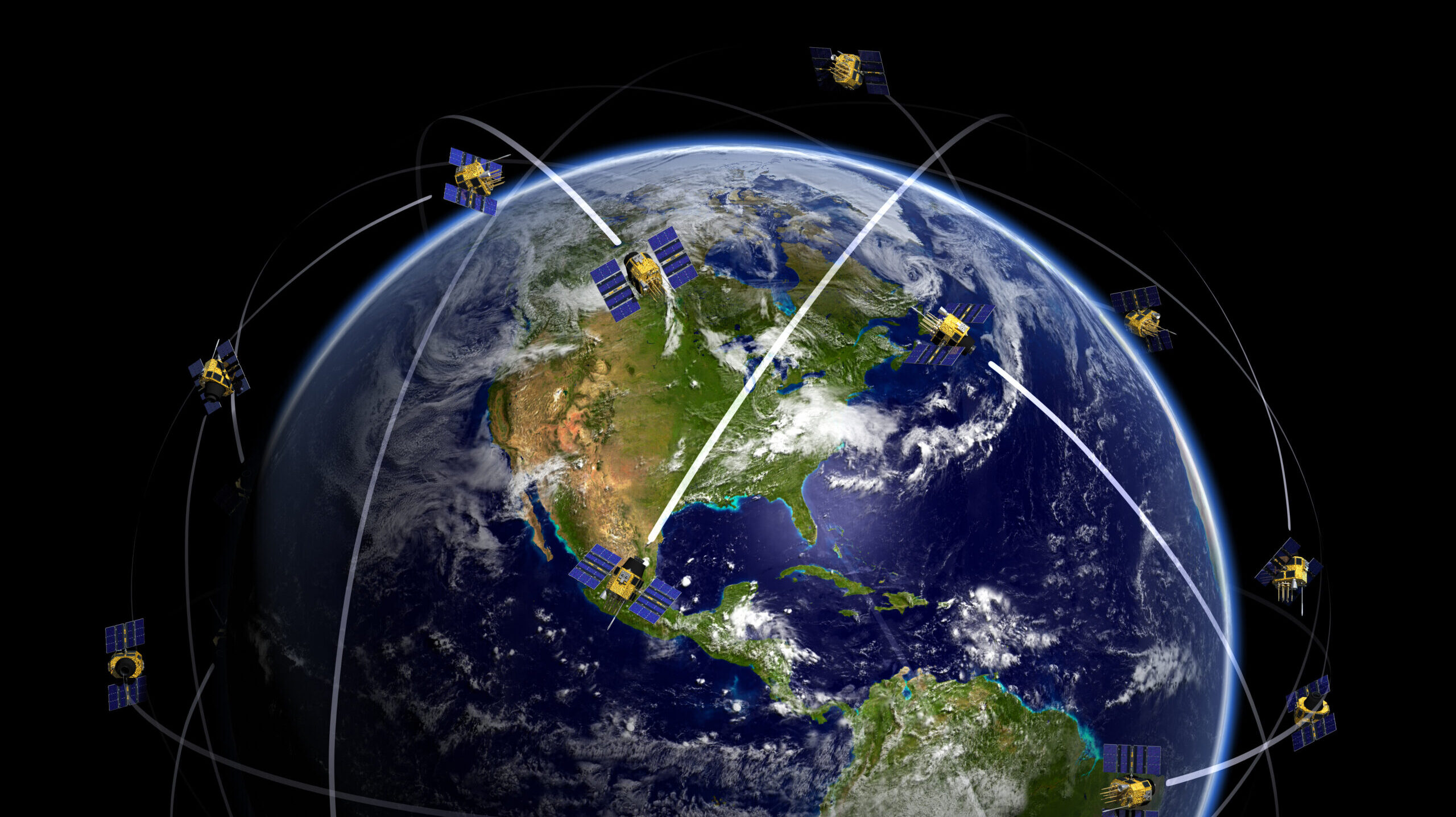
A 3D rendering of the GPS constellation in orbit around the Earth. (BlackJack3D/Getty Images)
WASHINGTON — Ligado Networks today sued the federal government of $39 billion, alleging that officials at the Departments of Defense and Commerce took “unlawful actions” to, in effect, improperly seize without compensation the firm’s L-band spectrum granted by the Federal Communications Commission in 2020 over department objections.
“The lawsuit, filed in the U.S. Court of Federal Claims against the United States, the Defense Department, the Commerce Department and NTIA, seeks just compensation for the government’s physical, categorical, regulatory and legislative takings of Ligado’s property,” the company said in a press release.
First reported by the Wall Street Journal, the legal action is the latest move in what has been a decades-long saga involving bankruptcies, corporate restructuring, allegations of malfeasance, a plethora of suits and countersuits, government-company duels over the results of scientific studies, and high-level congressional politics.
The current episode of the drama dates to the controversial 2020 FCC decision that one source with ties to the case described as a “rezoning” of spectrum allocated to satellite users for a planned 5G terrestrial cell phone network — overriding concerns from DoD, Commerce, and other federal entities that Ligado’s plans would interfere with GPS receivers.
It also comes as Ligado faces the prospects of defaulting on some $4 billion in loans and bonds that come due next month, telecommunications industry analyst Tim Farrar, of Telecom, Media and Finance Associates, told Breaking Defense.
“The debt holders have got to decide whether to give them an extension or whether to put them into bankruptcy, and I guess there’s definitely different considerations that come into play there. Like, for example, bankruptcy is a quite an expensive proposition,” he said.
Ligado’s suit filed in the United States Court of Federal Claims [PDF] makes a number of allegations, including that the Pentagon has “taken Ligado’s spectrum for the agency’s own purposes, operating previously undisclosed systems that use or depend on Ligado’s spectrum without compensating Ligado.”
Those systems, a source close to the case said, are certain classified radars rather than GPS systems.
The suit cites a high-level DoD “whistleblower” who “revealed internal emails and discussions” that the company claims show DoD and Commerce “fabricated arguments, misled Congress in testimony supporting anti-Ligado legislation, and orchestrated a public smear campaign, which included repeating those false claims to the public and threatening Ligado’s business partners with canceling their own government contracts if they worked with Ligado.”
A DoD spokesperson referred questions to the Justice Department, which did not respond to a query by press time.
The suit’s referenced legislation is the 2021 National Defense Authorization Act, which prohibited DoD from contracting with any entity engaged in commercial terrestrial operations within Ligado’s frequency bands, unless the Secretary of Defense issued a waiver saying that there would be no harmful interference with GPS receivers. The NDAA also required a study by the National Academies of Sciences, Engineering, and Medicine on potential interference impacts — a study which found that while “most” commercial GPS receivers would not have been banned, Iridium’s mobile satellite services used by the Pentagon might experience “harmful interference.”
In an August report shared with Breaking Defense, Farrar detailed Ligado’s financial woes and explained that the firm put its plans for a 5G network on hold following the study, instead entering “discussions” with Commerce’s National Telecommunications and Information Administration (NTIA), which coordinates use of spectrum by US government agencies, including DoD — presumably about compensation.
“It would be very hard to see how a multi-billion dollar compensation package for Ligado could be offered by the NTIA and approved by Congress,” he wrote at the time. The report thus predicted that the firm would file for bankruptcy this month or next, as well as sue the federal government in the hopes of salvaging at least some of its expected losses.
“There is no way that these investors are not going to lose billions of dollars. It’s as simple as that,” Farrar told Breaking Defense today.
That said, Farrar said the case is extremely complex, with both sides having some points in favor of their arguments and some understandable grievances. But in the end, he predicted it would be a “tricky” case for Ligado to win.
The firm’s biggest problem, he opined, is that the company passed up multiple “opportunities” to work with NTIA and “the GPS industry” — meaning heavy-hitting users in the defense, agricultural, and transportation sectors — to find mutually acceptable solutions, preferring to instead make the issue a “political” one by deploying an army of lobbyists to make its case.
“To some degree, you could say: ‘You live by the lobbyists, you die by the lobbyists’,” he said.
The company and its supporters beg to differ on both of Farrar’s assessments.
“At its own cost, Ligado developed solutions to ensure that its services would not harmfully interfere with signals in adjacent spectrum bands—including spectrum allocated to GPS service—and made significant concessions to overcome these technical issues,” the firm’s lawsuit stresses.
“They have a pretty good case,” argued one of the firm’s supporters.








